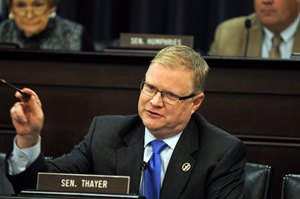Kentucky Considers Using KTDF Money in Claiming Races


A task force of Kentucky lawmakers meeting Nov. 19 in Frankfort sounded receptive to the idea of using Kentucky Thoroughbred Development Fund money to boost purses for Kentucky-breds in claiming races run in the state.
State Senator Damon Thayer, co-chairman of the Pari-Mutuel Wagering Taxation Task Force, expressed support for lifting a Kentucky law that currently restricts the types of races that KTDF purse money can support. Thayer, a Georgetown Republican and majority floor leader, said he would support removing that restriction and allowing the KTDF advisory panel to determine how much money claiming races would receive.
"This is not a new idea, but it's an idea whose time has come," Thayer said, noting that he supported such a move as early as 2009. "I do think it's a great idea.
"It's been suggested that we statutorily set a floor for the level of claiming race that it would be allowed to be used, but I would rather we change the statute and keep it more broad for all claiming races and then let the KTDF Advisory Board make recommendations and actually set the rules through the racing commission."
The task force was formed after legislation protecting historical horse racing games as pari-mutuel wagering was signed into law in February 2021. Friday marked the task force's fifth and final hearing on tax and pricing issues related to HHR and pari-mutuel wagering.
The KTDF program offers bonus purse money for Kentucky-breds in stakes, allowance, and maiden races in the state. The money is generated through an excise tax on pari-mutuel wagering (including HHR pari-mutuel wagering). With the success of HHR and the increased available funding, some have called for making Kentucky-breds in claiming races eligible for KTDF money.
Speaking at Friday's task force meeting, Kentucky Horsemen's Benevolent and Protective Association president Rick Hiles said such a move would benefit state racing, could help keep horsemen in the state, and potentially attract new owners.
"It's going to help the owners and everyone because they're going to run for more purse money. It may entice an average guy that wants to get into the horse racing business," Hiles said. "It would be more money that an owner can make with just regular, everyday claiming horses. Not everybody can afford to spend $50,000, or $100,000, or $200,000 on a horse but maybe they're able to afford to spend $5,000 to $10,000 to get into a claiming horse.
"By putting this extra money in these claiming races, it allows an owner to recoup his investment. It allows him to enjoy the game and it may even create more claiming (activity) going on which the general fund in the state benefits from because every time a horse gets claimed, this general fund gets a 6% sales tax on the value of that horse."
Task force member Rep. Matt Koch, a Paris Republican, said he supports opening up KTDF money for claiming races but said it's important to get that funding right to ensure equine safety—avoiding creating a situation where the purses are so beyond the value of the horses competing that horsemen start taking chances. Thayer also acknowledged that concern and said the KTDF advisory panel was likely best positioned to determine the right purse commitments.
